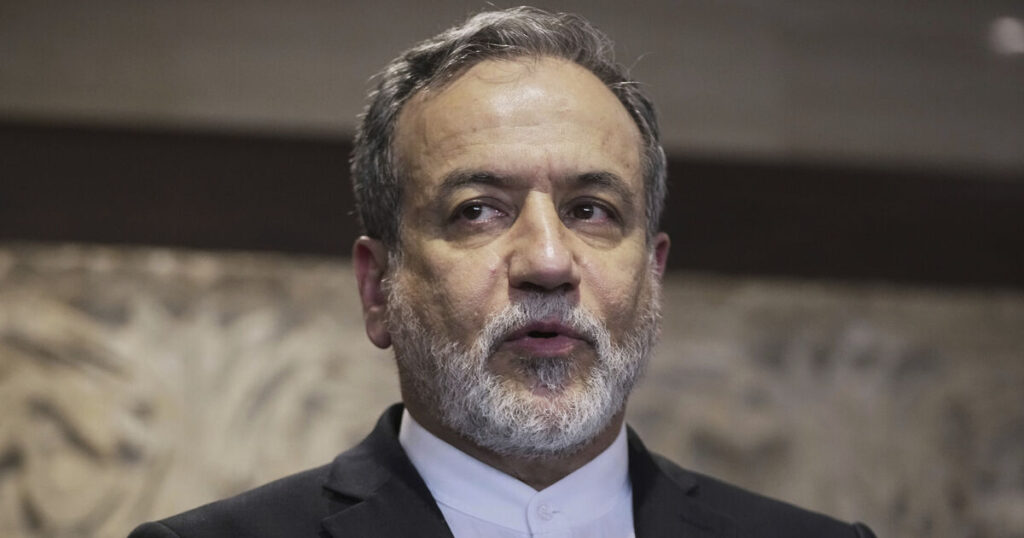Iran’s foreign minister will meet counterparts from Germany, France and the UK in Geneva on Friday, Iranian state media and European diplomats have said.
The news comes as Israeli airstrikes target Iran’s nuclear and military sites, and Iranfires back.
Europe’s push for diplomacy is in sharp contrast to messages from Washington, with US President Donald Trump openly weighing bombing Iran and calling for the unconditional surrender of the Iranian leadership.
Iran’s foreign minister, Abbas Araghchi, will travel to Geneva for the meetings on Friday, the state-run IRNA news agency reported. European diplomats, who spoke on the condition of anonymity, confirmed the meetings.
“All sides must show restraint, refrain from taking steps which lead to further escalation in the region, and return to diplomacy,” a joint statement issued on Wednesday by France, Germany, the UK and the EU read.
The three European countries, commonly referred to as the E3, played an important role in the negotiations over the original 2015 nuclear deal with Iran. But they have repeatedly threatened to reinstate sanctions that were lifted under the deal if Iran does not improve its co-operation with the UN nuclear watchdog.
The meeting in Geneva could also provide the three European nations with a unique opportunity to reach out to Iran in what is going to be the first face-to-face meeting between Western officials and Tehran since the start of the conflict a week ago.
UK Foreign Secretary David Lammy is flying to Washington on Thursday to meet US Secretary of State Marco Rubio.
The US may want to use the UK-controlled base on Diego Garcia in the Indian Ocean in a potential strike on Iran’s underground nuclear facility at Fordo, but is not believed to have requested to do so yet.
“The EU will continue to contribute to all diplomatic efforts to reduce tensions and to find a lasting solution to the Iranian nuclear issue, which can only be through a negotiated deal,” Anouar El Anouni, a spokesperson for the European Commission, said.
“This is why, an intense outreach activity involving all relevant sides is currently underway to preserve room for diplomacy and create the conditions for a negotiated solution to the Iranian nuclear issue.”
Germany’s foreign minister has underlined European countries’ willingness to talk to Iran about a solution to its nuclear programme, but says there needs to be movement from Tehran.
Johann Wadephul said on Wednesday that the three European countries, which were part of Iran’s 2015 nuclear agreement, “still stand ready to negotiate on a solution”.
But he added: “Iran must now move urgently. Iran must take confidence-building and verifiable measures – for example, in that the leadership in Tehran makes it credible that it is not striving for a nuclear weapon.”
French foreign minister Jean-Noel Barrot said on Thursday that France and European partners were ready to “resume negotiations” with Iran.
Mr Barrot did not confirm the Geneva meeting.
The Iranian authorities’ message was “relatively clear: there is a willingness to resume talks, including with the United States, provided that a ceasefire can be reached”, Mr Barrot said in a news conference in Paris.
“On our side, there is a willingness to resume negotiations, provided that these negotiations can lead to lasting, substantial steps backward by Iran regarding its nuclear programme, its ballistic programme and its activities to destabilise the region,” Mr Barrot said.
Mr Trump has given increasingly pointed warnings about the US joining Israel in striking at Tehran’s nuclear programme even as Iran’s leader warned anew that the United States would be greeted with stiff retaliation if it attacks.
A US official said on Wednesday there were no plans for US involvement in nuclear talks set between senior European diplomats and Iran in Geneva, although that could change.
The official, who spoke on condition of anonymity, also noted that the Europeans have been wanting to play a role in the negotiations for months but have been held back by the US.
That position, the official said, may be changing as the hostilities intensify.


